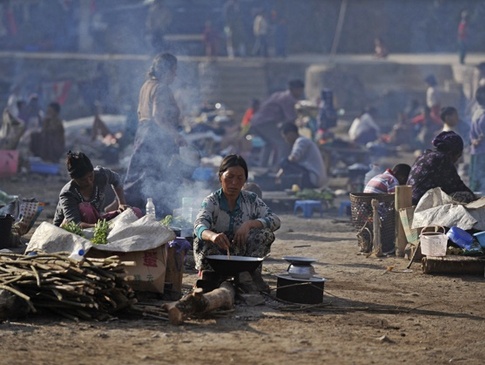Burma’s national human rights commission (MNHRC) has accused the army of committing serious abuses against civilians in Kachin state, in the wake of a five-day mission of inquiry to the conflict-torn region.
“Based on complaints we received, there are human rights abuses by armed personnel from the both sides of the conflict – we want these to stop,” MNHRC Secretary Sitt Myaing told DVB in an interview, although he refused to disclose how many complaints the commission had received.
A delegation from the rights body travelled to Myitkyina and Waingmaw between 23-27 July to investigate widespread allegations of human rights violations that have haunted the conflict since its start in June last year. Government forces have been accused of systematically razing villages, torturing, raping and killing civilians.
The delegation met with displaced Kachins, as well as 25-year old prisoner Lahtaw Brang Shawng, whose detention and alleged torture has attracted widespread condemnation from rights groups.
According to the Asian Human Rights Commission (AHRC), the father of three was “severely tortured” before confessing to working for the Kachin Independence Army (KIA) – an allegation the rebel group also denies. He is now being charged under the Unlawful Associations Act.
The MNHRC’s decision to meet with Lahtaw Brang Shawng follows mass protests in Myitkyina against his arrest, after pictures of his mutilated body circulated on the internet. Locals have reported a surge in detentions of “rebel sympathisers” in Kachin state, while the government receives international praise for the release of political prisoners elsewhere in Burma.
“We were not originally planning to meet with U Brang Shawng, but decided to after hearing about his situation,” said Sitt Myaing. “We told the relevant officials that they must conduct interrogations in accordance with the law and urged them not to torture him.”
The commission – created by an executive order of President Thein Sein in September 2011 as part of his much lauded democratic reform programme – has been criticised for failing to challenge the government on sensitive issues, including ethnic grievances. In February, Chairman Win Mra ruled out the possibility of investigating abuses in Kachin state, insisting that “the national reconciliation process is political.”
The recent mission forms part of the commission’s broader mandate to investigate complaints into rights abuses and says it will release a situation report on Kachin state in the coming weeks. However, the commission is notorious for its lack of transparency and previous visits to the conflict-torn region have resulted in little concrete action.
“I’m glad that they’re recognising [abuses],” Phil Robertson, Deputy Asia Director at Human Rights Watch (HRW) told DVB. “The question is what they are going to do to pressure the government. They need to prove that they are actually prepared to do something, starting with a good set of recommendations made publicly.”
None of the recommendations presented by HRW in their March report on the Kachin conflict have yet been implemented, such as providing full humanitarian access for UN agencies and holding criminal investigations into allegations of abuse. The only case to be presented to the Supreme Court was thrown out in March citing a lack of evidence.
UN Special Rapporteur on Human Rights for Burma, Tomas Quintana, who recently completed a six-day visit to the country, said that the human rights situation in the country remained “serious” and called for the creation of a truth commission to address grievances from decades of abuse. In an earlier interview with DVB, Quintana admitted that an international commission of inquiry was no longer “politically feasible”.
Rights groups say that the MNHRC could play a leading role in establishing a domestic accountability mechanism, but still lacks political independence and a credible institutional framework. Although the commission is currently drafting a parliamentary enabling law, civil society groups have raised concerns about the lack of clarity and inclusiveness of the process.
“This commission is still a long way away from compliance with the Paris Principles on the independence of human rights institutions and even if that law is passed – and no one’s seen that law – is raises questions of whether it will actually result in independence for the commission,” said Robertson.
Analysts suspect the new legislation is only intended to secure funding for the commission, which was cut off in March after the parliament deemed its creation by presidential decree “unconstitutional”.
Hundreds of people have died and over 80,000 displaced in Kachin state after a 17-year ceasefire between rebels and the government broke down. Thein Sein has been slated for failing to end the violence, despite publicly ordering the army to assume a defensive position.
– Shwe Aung contributed reporting.



